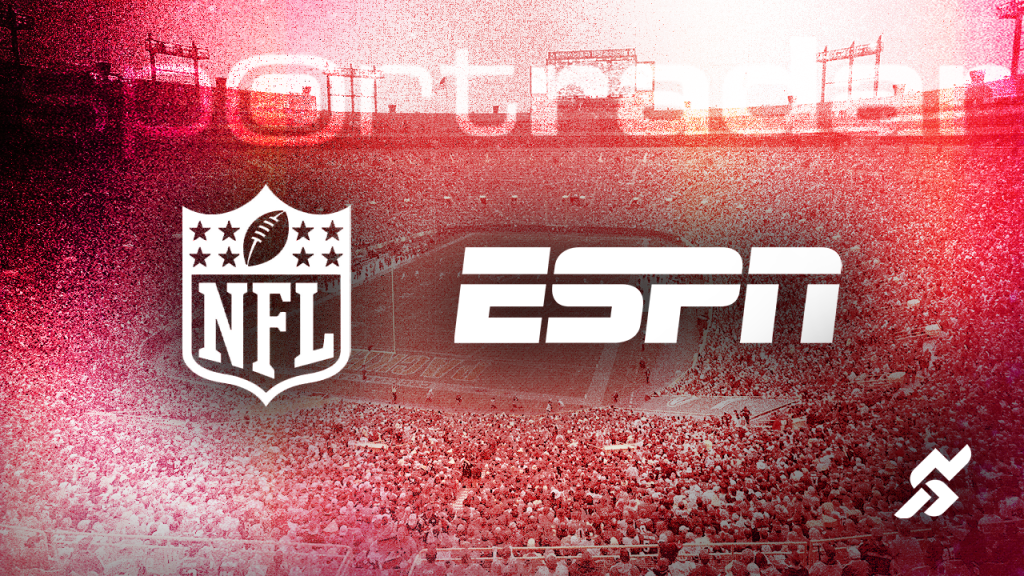The recent tie-up between the NFL and ESPN, in which the league took a 10% stake in the sports media giant, contains a big unanswerable question: Will it ensure the network keeps its Monday Night Football rights for the foreseeable future?
Many believe the answer is yes. But the NFL was in a similar position in 2021, in talks to renew a prominent commercial deal with a partner in which it also held an ownership stake, and the league ultimately selected a higher bid from the company’s biggest competitor.
Back in 2015, the NFL signed a four-year data deal with Sportradar, at the time a private company relatively unknown in the U.S. This was before the nationwide ban on sports betting was lifted, but the NFL’s media data was still a robust business, and it wasn’t impossible to foresee a future where its betting feed was be the industry’s most valuable commodity. As part of that original deal, the NFL took an undisclosed stake in Sportradar’s growing U.S. business. The deal was extended again in 2019, and when Sportradar went public in 2021, it disclosed that the NFL owned a 7% non-voting share of its U.S. operations. Some NFL owners also invested in Sportradar separately.
Yet when the NFL was in the market for a new data deal around that same time, it ended up with a different partner. In April 2021, following months of negotiations, the NFL announced an exclusive global deal with Genius Sports, Sportradar’s main rival. Genius made a notably higher offer.
That deal also had a significant equity component. It included penny warrants for 22.5 million shares in Genius Sports (NYSE: GENI) stock. At the time that was worth $446.6 million; it is currently worth about $283.5 million. The NFL has added additional warrants in later extensions of the Genius relationship.
Equity upside has been a growing priority for the NFL over the past decade. The world’s richest sports league is a key man of sorts for many of its partners, and commissioner Roger Goodell has begun prioritizing the opportunity to more directly share in the growth of companies that profit from football. This was the driving force behind 32 Equity, the league’s venture arm, and the warrants that appear in a number of the NFL’s commercial deals.
The Sportradar equity—and the Genius equity as well—is accounted for differently from the investments made by 32 Equity. As Sportico explained in a story last week, 32 Equity deals are held entirely by owners, as is their financial upside. The equity and warrants that the league receives as part of its commercial deals, like these data tie-ups, are shared with players under the cap. The most recent CBA includes a detailed section about how that equity is amortized out over a 10-year span and shared with players at fair market value.
It’s unclear exactly how the league’s 10% stake in ESPN works in that regard. (An NFL spokesman declined to comment). But it is notable that the partnership is technically two different non-binding agreements. In one, ESPN acquired NFL Network, RedZone and NFL Fantasy in exchange for that 10% stake. In the other, the NFL will license rights—like live games, logos and other IP—to ESPN. That appears to be structured so players get their share of those rights, but not in the ESPN equity portion. The 10% stake is likely worth at least $2 billion, and as Disney chairman Bob Iger shared last week, the NFL will receive dividends from ESPN profits.
Many have interpreted this deal, in particular the 10% stake, as a back-end way for ESPN to guarantee proximity to its most valuable content partner. A LightShed Partners analyst note said the deal “dramatically improves ESPN’s chances of renewing Monday Night Football beyond the current 2033 expiration.” On a recent Semafor podcast, Pablo Torre said his former employer essentially secured “most-favored-nation status unto eternity” with the league.
But history shows that’s not always the case. The NFL also received equity warrants in its 2006 supplier deal with Under Armour, and that didn’t appear to grant the apparel company any prime positioning in future talks. In fact, Under Armour let its NFL deal lapse in 2020 as part of a multiyear restructuring, then returned to the league for this upcoming season.
Neither Sportradar nor Under Armour provide a perfect comparison for ESPN. Broadcast agreements are way more valuable, and media is changing at a much faster clip. All of that sets the stage for a critical 2029.
That’s when the NFL can—and will—opt out of its current $110 billion media deals and renegotiate a whole new package. The league still cares about TV, and reach has been critical to the league’s enduring success. But the NFL has also gradually dipped its toes into the streaming waters with Amazon and Netflix. Those companies have virtually unlimited funds and a growing appetite for sports. It seems very possible—likely in fact—that at least one of the NFL’s four primary broadcasters ends up without games starting with the 2030 season.
Will that be ESPN? It seems less likely now than two weeks ago. But as Sportradar learned in 2021, existing ties only go so far. If the price is right, your NFL deal may soon be held by your biggest competitor.
Read the full article here



